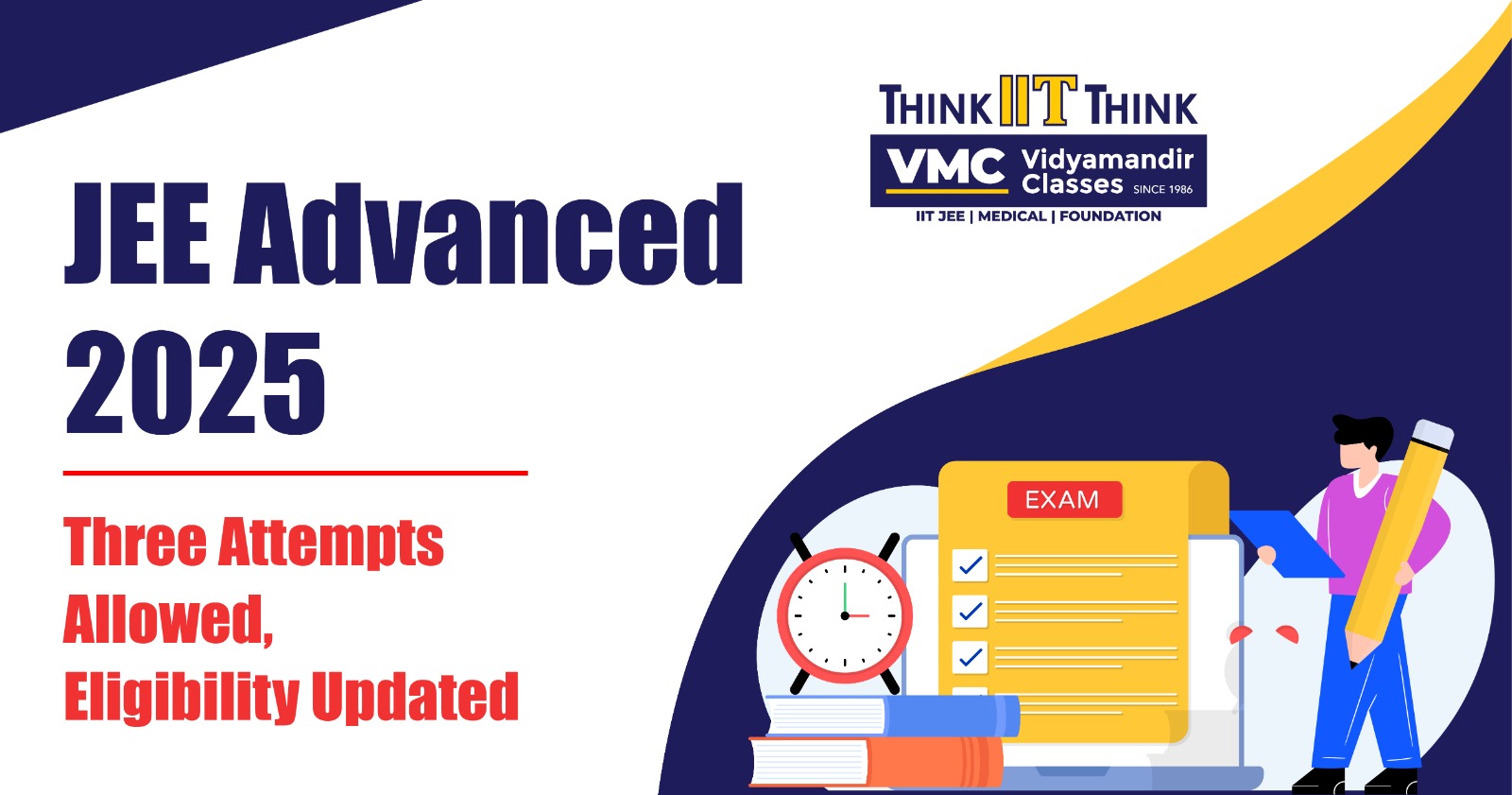JEE Advanced 2025: New Opportunity for Aspirants with Three Attempt Limit & Updated Eligibility Criteria
 Posted On
Posted On
236 total views, 2 views today
In a major announcement for engineering aspirants across India, the number of attempts allowed for the Joint Entrance Examination Advanced (JEE Advanced) has increased from two to three. This change means that candidates now have a total of three chances to clear this highly competitive exam over three consecutive years. This policy update offers greater flexibility and a new opportunity for students to excel in one of India’s toughest entrance exams. Here’s a detailed breakdown of this change and other essential eligibility criteria for JEE Advanced 2025.
Increased Attempt Limit for JEE Advanced
Previously, candidates were only allowed two attempts for JEE Advanced in two consecutive years. With the recent update, students can now attempt the exam up to three times, spread over three years. This adjustment aims to give students more opportunities to succeed, accommodating those who may face unforeseen challenges in their initial attempts. The extended limit is a welcome change, potentially reducing the pressure to clear the exam within a limited timeframe and encouraging more thorough preparation.
Age Limit for JEE Advanced 2025
For the JEE Advanced 2025, candidates must have been born on or after October 1, 2000. However, there is a provision for age relaxation for candidates from specific categories. For SC, ST, and PwD applicants, a five-year age relaxation is provided. This means that eligible candidates from these categories should have been born on or after October 1, 1995.
JEE Main 2025 Eligibility and Top Ranks Requirement
While the number of attempts for JEE Advanced has increased, the criteria for qualifying through JEE Main remain consistent. Candidates aiming for JEE Advanced must rank among the top 2,50,000 successful candidates in the BE/BTech Paper I of JEE Main 2025. This list includes all categories, with specific percentage distributions for different categories:
- 10% for GEN-EWS candidates
- 27% for OBC-NCL candidates
- 15% for SC candidates
- 7.5% for ST candidates
- 40.5% Open to all categories
Moreover, within each category, a 5% horizontal reservation is provided for PwD candidates. It’s important to note that this number may exceed the initial 2.5 lakh threshold due to tied ranks or identical scores, ensuring that all deserving candidates get an equal opportunity.
Special Provision for OCI/PIO Candidates
In response to a Supreme Court ruling dated February 3, 2023, Overseas Citizens of India (OCI) and Persons of Indian Origin (PIO) who secured OCI/PIO cards before March 4, 2021, will be considered as Indian nationals for IIT seat allocation. However, such candidates are not eligible for reservations under any category except the OPEN-PwD category.
Eligibility Based on Class 12 Examination Timing
The timeline for candidates’ Class 12 (or equivalent) examination is crucial for JEE Advanced eligibility. To be eligible for JEE Advanced 2025, candidates must have first appeared for their Class 12 exams in either 2023, 2024, or 2025, with Physics, Chemistry, and Mathematics as mandatory subjects.
- Ineligibility for Early Attempts: Candidates who first appeared for the Class 12 (or equivalent) examination in 2022 or earlier are not eligible, regardless of the number of subjects taken or attempted.
- Special Eligibility Criteria for 2022 Candidates: If a candidate’s Class 12 board declared the results for the academic year 2021-2022 on or after September 21, 2022, those students can still qualify for JEE Advanced 2025 if they meet all other eligibility requirements. This provision accommodates students whose academic results were delayed due to exceptional circumstances, allowing them to remain eligible.
- Withheld Results: If a candidate’s Class 12 board announced the 2021-2022 results before September 21, 2022, but a particular candidate’s result was withheld, that candidate will not be eligible for JEE Advanced 2025.
Eligibility Criteria Regarding Previous Admission to IITs
Another important criterion focuses on prior admissions to IITs. Candidates who were previously admitted to an IIT, regardless of the academic program, are generally not eligible to appear for JEE Advanced 2025. This policy also applies to candidates who were allocated an IIT seat but subsequently left the program, regardless of the circumstances.
- Preparatory Course Exception: An exception is made for candidates admitted to a preparatory course in an IIT in 2024. Such candidates are still eligible to appear for JEE Advanced 2025.
- Seat Allocation Flexibility: Candidates who were allocated an IIT seat through the JoSAA (Joint Seat Allocation Authority) but did not complete the reporting process, or withdrew their acceptance before the final round, can also appear for JEE Advanced 2025. This provision also includes candidates whose seats were cancelled before the last round of seat allotment.
A Clear Path Forward for JEE Advanced 2025 Aspirants
The decision to allow three attempts for JEE Advanced comes as a significant relief for many students who face challenges balancing preparation with academic and personal pressures. It also opens doors for those who may have faced unforeseen obstacles during their initial attempts. This new flexibility provides an opportunity for more students to achieve their dream of securing a seat in one of India’s prestigious IITs.
With the added attempt, candidates can better plan and pace their preparation over three years, potentially enhancing their performance and chances of success. However, the other eligibility criteria remain rigorous, emphasizing the high standards expected from future IIT students.
Preparing Strategically for JEE Advanced
For students gearing up for JEE Advanced, understanding these eligibility updates is the first step. Here are some pointers on how to approach preparation strategically:
- Plan for Multiple Attempts: With three chances now available, candidates should create a three-year study plan if they are starting early. This allows them to review, refine, and advance their understanding of key concepts without excessive pressure.
- Focus on JEE Main and the Top 2,50,000: Since the top 2,50,000 JEE Main qualifiers are eligible for JEE Advanced, candidates should aim for a high JEE Main score. This not only qualifies them for JEE Advanced but also sets a strong foundation.
- Stay Updated on Category-Specific Provisions: With reservations and tied-score considerations affecting the final cut-off numbers, candidates should be aware of these rules to better understand their standing.
- Leverage the Additional Time for Class 12 Review: The eligibility criteria allow for three specific years of Class 12 appearances. This enables candidates to allocate extra time for mastering the Class 12 syllabus, which is crucial for JEE Advanced success.
- Consider Preparatory Courses If Needed: Candidates who were admitted to a preparatory course in an IIT in 2024 can appear in 2025, giving them time to strengthen their foundation.
Conclusion: Embracing the New Opportunities in JEE Advanced 2025
The expanded eligibility for JEE Advanced 2025 reflects a progressive approach to India’s engineering entrance exam structure, allowing students more flexibility and resilience in their journey to the IITs. This shift aligns with the evolving academic environment, which increasingly values persistence alongside talent. The increased attempts offer a ray of hope for many aspirants, motivating them to excel without fear of missing out due to limited chances.
Candidates are encouraged to thoroughly review the eligibility criteria, especially regarding the Class 12 examination timeline and prior IIT admissions, to ensure they meet all requirements. With thoughtful preparation and the strategic use of their three attempts, aspiring engineers can now pursue their dreams with renewed confidence and clarity.



